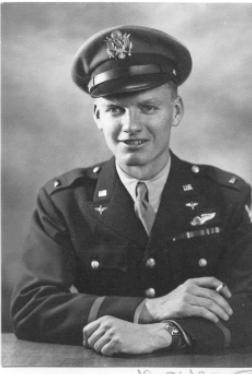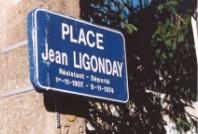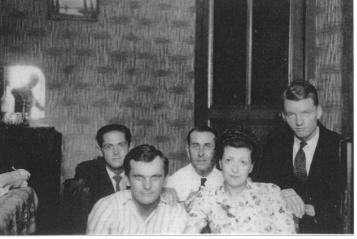|

 6. In the city 6. In the city
We must have ridden twelve or fifteen miles before the city came into view. My friends were in good spirits and had joked and laughed a lot during the trip (1).
It was necessary to cross a river before entering the town. This was Saturday night and there was a large number of people crossing the bridge on foot and on bicycles. The German guard at the far end of the bridge was not checking identification papers and took no notice of us as we rode by.
We rode up an alley, parked the bicycles in the back yard and entered a modest but comfortable house. I learned that we were in Jean's house(2) and his companion was Felix(3). Jean introduced me to his wife, a charming Frenchwoman. Jean introduced me to his wife, a charming Frenchwoman.
Jean produced a bottle of wine and glasses. We drank wine and talked far into the night, despite my limited French vocabulary. That night I slept in a wonderfully soft bed for the first time in a week.
Jean woke me late the next morning and said he had another guest coming for dinner. He produced a razor, toothbrush and hot water for a bath.
I felt clean and fresh for the first time in a week as I entered the parlor. Jean's guest startled me; I could hardly believe my eyes. Bill Wetzel(4), my pilot, was sitting in this very room.
Bill and I had a great deal to talk about as we recounted the events of the past Sunday. With Jean and Felix filling in details, we learned that the rest of our crew had fallen into German hands the first day.
Bill had a long, narrow wound on one cheek which was starting to heal. A German soldier had shot and grazed him as he was descending in the parachute. On one occasion during the week he had narrowly escaped being captured when a German patrol searched the farm where he was hiding.(5)
Life at Jean's house settled into a routine. Listening to the BBC news program in the evening was a luxury we hadn't expected. Bill and I spent the daytime hours in an upstairs bedroom, being very quiet. The household continued to function normally to avoid arousing suspicion. A small number of Frenchmen were apparently still sympathetic to the German cause. They and the Germans represented a threat that had to be reckoned with in planning every action.
 In the evenings Jean, Felix and their friends would discuss hopes and plans for our escape, while we all drank wine. They were investigating two possible plans for our escape. One plan was to arrange for a small boat to pick us up at some isolated part of the coast. This plan was soon discarded when they learned that the Germans had recently strengthened the coastal defenses and patrols. The other plan was to have an Allied airplane fly in below the radar defenses, land at a prearranged field or pasture and then return us to England. The Frenchmen were very optimistic about this latter plan. When they learned, some four or five days later, that it was impossible to arrange for an airplane, they were downcast. It would now be necessary to plan for the long journey south. In the evenings Jean, Felix and their friends would discuss hopes and plans for our escape, while we all drank wine. They were investigating two possible plans for our escape. One plan was to arrange for a small boat to pick us up at some isolated part of the coast. This plan was soon discarded when they learned that the Germans had recently strengthened the coastal defenses and patrols. The other plan was to have an Allied airplane fly in below the radar defenses, land at a prearranged field or pasture and then return us to England. The Frenchmen were very optimistic about this latter plan. When they learned, some four or five days later, that it was impossible to arrange for an airplane, they were downcast. It would now be necessary to plan for the long journey south.
Several times we took long walks in the evening. It was a relief to get outside, even if some risk was involved. One evening we visited a doctor at his home. The doctor examined my back, which still pained me most of the time. He couldn't determine the exact injuries without an X-ray picture, but his examination indicated that I had suffered a fractured vertebra. The doctor had several bottles of vintage champagne which the Germans had not liberated. We drank a number of toasts to the defeat of les Allemands.
It was decided that the number of people going to and from Jean's house might arouse suspicion. Arrangements were made for us to stay at two other homes for four or five days until the plans were completed for our journey.
The plans were completed and we returned to Jean's house for final preparations. Identification papers had been expertly forged. We would ride a night train to Paris where the final plans for escape would be made. Our companion and guide would be a young Frenchman. We were to play the part of deaf mutes and our guide would do the necessary talking.
Bidding farewell to friends like these was difficult, even though I was experiencing the exhilaration of finally beginning the journey to freedom. Jean had presented me with one of his best pipes when he learned that I enjoyed pipe smoking. Before leaving, his wife gave me a small medal of St. Christopher saying that he would guide me on a safe journey. I was not familiar with the roles of the various saints, but I was grateful for her prayers and concern for my safety.
I decided to give her my navigator wings. I still had my identification tags and rank insignia to prove my identity if I was captured. A pair of silver wings seemed to be a very small gift for a group of people who had risked death, under the very noses of the Germans, to aid me.
 (1) Jean Ligonday, Jean Nicolas and Félix Robic would be, according a letter written by Jean Nicolas, the Frenchmen who cycled with Ralph McKee, from St-Philbert de Grand Lieu to Basse-Indre.
(1) Jean Ligonday, Jean Nicolas and Félix Robic would be, according a letter written by Jean Nicolas, the Frenchmen who cycled with Ralph McKee, from St-Philbert de Grand Lieu to Basse-Indre.
(2) Jean Ligonday in INDRE.
(3) Félix Robic or Félix Guyot, resistants. Félix Guyot, was grocer and Mayor of Basse-Indre.
(4) William Wetzel (Bill)
(5) Hamlet of Villeda in St-Philbert-de-Grand-Lieu
 Read Jean Ligonday biography Read Jean Ligonday biography
 Read the escape of pilot W. Wetzel Read the escape of pilot W. Wetzel
[Top] [Next]
|
|

